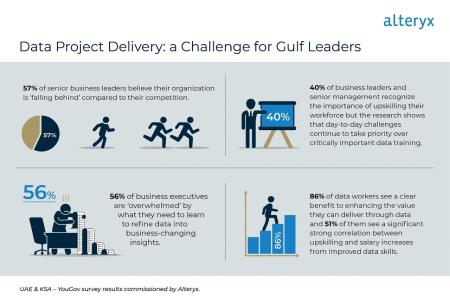Alteryx, Inc. (NYSE: AYX), the analytics automation company, today highlights a core discrepancy between the accelerated pace of digital transformation and the provision of the foundational skills needed to deliver it. Despite workers’ confidence in providing business value through their data skills, the research calls future digital competitiveness into question due to stalled digital upskilling in recent months.
Almost half (40%) of these business leaders recognise that driving upskilling initiatives is the responsibility of ‘top management’, but the research shows that day-to-day challenges continue to take priority over critically important data training. 45% of data workers are unable to upskill at as they continue to be pulled into day-to-day tasks, while one in four (24%) do not know where to start.
Leadership and data workers: priorities at loggerheads
40% of Gulf C-Suites, VPs and business unit leaders responsible for driving upskilling strategies see little difference between the skills needed today and those needed in five years’ time. Despite this lack of forward-thinking from business leadership, 86% of data workers see a clear benefit to enhancing the value they can deliver through data. Interestingly, 28% have already begun this upskilling journey, and 18% say they have already completed it.
For Gulf business leaders, understanding and fully utilising digital skills is essential for success. Enabling these workers to use their skills for business benefit will also significantly drive competitiveness. 51% of data workers admitted they see a significant strong correlation between upskilling and salary increases from improved data skills, with 10% expecting a 71-100% salary increase and 57% expecting a salary increase of at least 21% from upskilling. With this high expectation of a salary increase, it comes as no surprise that 64% of Gulf data workers are motivated to upskill themselves outside of business-led training.
“The fields of data analytics and digital transformation continue to challenge companies to break the mould and deliver new and constantly evolving ways to upskill and deliver ROI,” comments Alan Jacobson, Chief Data and Analytics Officer at Alteryx. “A core feature of digital transformation that is often underconsidered is the human factor, and the development of the foundational skills required to make such projects a success.
“With data workers entering employment at any and all skill levels across the analytic continuum, leadership must commit with conviction to evolve beyond any antiquated approach to data literacy and analytics utilisation and drive a cultural shift to delivery within their organisation that starts with employees. Only by making long-term commitments to prioritise – and investments to incentivise – good quality data work will the workforce be empowered to deliver more efficient outcomes and ensure competitiveness going forward.”
Three core business challenges stalling data literacy as highlighted in the research include:
- A disconnect between digital skill use and the business reality: leaders require digital expertise but fail to enable workers in utilising them.
- A shift in the organisational structure for training: workers are instinctively reinforcing the view that those closest to a problem are best placed to solve it but are not supported on their upskilling journey by those senior to them.
- Employer perception: almost half of the leaders responsible for driving these upskilling programmes see little requirement for new data skills in the next five years.
Research reveals that it will be critical for businesses to deploy strategies to help drive the skills upgrade:
- Formalise a clear and communicated data strategy alongside upskilling programs that address the core competencies of data literacy required across the entire analytics journey. 24% of data workers report they received no data training at all from their employer. There is a clear opportunity to standardise skills through internal training projects to deliver success and enable existing workers.
- Digital transformation should target cultural, upskilling and technology strategies that help to create analytics competency to fuel digital innovation. Corporate-led upskilling has not kept up with the pace of accelerated transformation seen through Covid. Although businesses see themselves as falling behind their peers, there is an inconsistency between the value placed on digital skills, the responsibility for precisely who will deliver it, and the prevalence of these skills in the future.
- Cultivate a culture of data analytics from the top-down, enabling workers to deliver efficient benefit through digital skills. Almost half of Gulf leadership teams know the skills challenges they face will harm their business. There is strong demand for digital skills to fully meet the new challenges posed by an increasingly digital workplace. Enabling skilled workers to deliver on their own skills is a core – and underconsidered – strategy to drive competitiveness
“The skills disconnect has the potential to seriously hinder the Gulf’s competitiveness on a global scale Kerry Koutsikos, VP, MEA, at Alteryx adds. “As our business environment becomes increasingly digital, data literacy is the skill that will pay off both in the short and long-term – moving businesses away from time-consuming manual tasks and towards automated insight generation for faster time-to-insight and accelerated decision-making.
“Only organisations that empower their workforce to affect business-change with data will reach the true potential of their digital transformation initiatives, but the core gap between the high business value attributed to such skills and the resources applied to upskilling in this area will stall transformation. With formal education still decades from catching up to the business reality, it is the responsibility of individual businesses to incentivise workers and reward good quality data work.”

